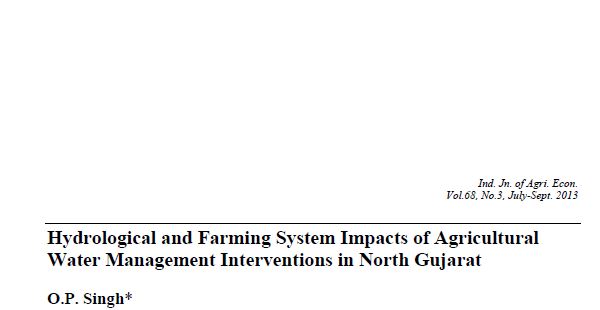Hydrological and Farming System Impacts of Agricultural Water Management Interventions in North Gujarat
Groundwater overexploitation is a common phenomenon in many arid and semi arid regions of the world. Within India, north Gujarat is one of such intensively exploited regions. Groundwater supports irrigated crop production and intensive dairy farming in the region. Well irrigation is critical to the region’s rural economy and livelihoods. The overall objective of the study was to examine the water demand management interventions on farming system, livelihood patterns, food and nutritional security and poverty. The study was based on the primary data collected from north Gujarat. The study suggests that the micro irrigation (MI) technology adoption had resulted in reduction in water application and improvement in crop yield varied from crop to crop. On an average, the net returns from MI irrigated plots are higher than that of plots irrigated by conventional method. The water productivity of the crops irrigated by MIs, in both physical and economic terms, was found to be much higher than that of their counterparts irrigated by traditional method. The benefit-cost analysis of MI-systems shows significant variations among different crops. The overall impact of MI adoption on the income of adopter families is striking, exceeding one lac rupees per annum. Such high escalations in annual income of a farm household can change the entire household dynamics. Adoption of MI systems with the introduction of new water efficient crops had resulted in significant reduction in water use at the farm level. The average reduction was estimated to be 7527m3 per farm, whereas at the regional level, the total groundwater saving for irrigation was estimated to be 224MCM per annum.
